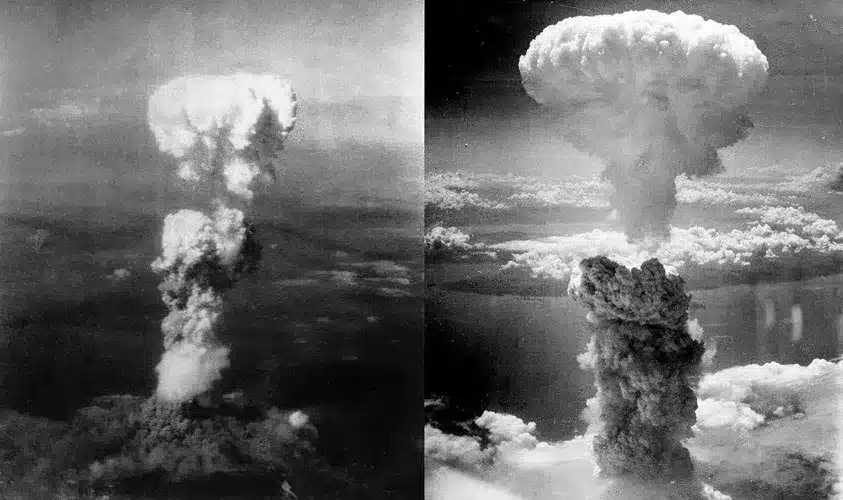Nagasaki Day: History, Theme, and Significance

Atomic bomb mushroom clouds over Hiroshima (left) and Nagasaki (right)
Nagasaki Day is observed every year on August 9 to promote peace politics and raise awareness of the effects of the bomb attack on Nagasaki. Nagasaki city was attacked by atomic weapons that killed thousands of lives instantly. It is the 77th anniversary of the atomic bombing of the Japanese city.
History of Nagasaki Day
Nagasaki Day, observed annually on August 9th, holds profound significance in the annals of world history. It marks the somber anniversary of the atomic bombing of Nagasaki, Japan, during World War II, an event that stands as a stark reminder of the destructive power of nuclear weapons and the value of human life.
On this day in 1945, the United States dropped the second atomic bomb, codenamed ‘Fat Man’, on the city of Nagasaki, resulting in the loss of over 80,000 lives. The bombing, following the earlier attack on Hiroshima, ultimately led to Japan’s unconditional surrender and the end of World War II.
Significance of Nagasaki Day
The commemoration of Nagasaki Day is not merely a remembrance of the past but a continued call for peace and the abolition of nuclear weapons. It serves as a day of reflection on the catastrophic consequences of war and the urgent need for disarmament to ensure such tragedies never recur. The day is marked by ceremonies and peace activities around the world, emphasizing the importance of international cooperation and efforts towards achieving a nuclear-free future.
Nagasaki Day also honors the resilience and spirit of the survivors, known as hibakusha, many of whom have dedicated their lives to advocating for peace and sharing their harrowing experiences to educate future generations about the horrors of nuclear warfare and the importance of peace politics.
As we observe Nagasaki Day, it is a moment to reflect on the lessons learned from history and the collective responsibility to foster a world where peace prevails over conflict, and where humanity’s future is secured not through the might of arms, but through mutual understanding and respect. Let us renew our commitment to peace and work together towards a world free of nuclear weapons, where the shadows of Hiroshima and Nagasaki no longer loom over humanity.
The theme of Nagasaki Day 2024
Nagasaki Day is observed on 9 August every year to mark the anniversary of the atomic bombings of Hiroshima and Nagasaki during World War II. There is no specific theme for the day.
Quick facts atomic bombing of Hiroshima and Nagasaki
- On 6 and 9 August 1945, the United States dropped two atomic bombs on the Japanese cities of Hiroshima and Nagasaki, respectively.
- The US dropped a nuclear bomb on Hiroshima on 6 August 1945, killing 140,000 people.
- Three days later, on 9 August 1945, it dropped another bomb on Nagasaki, killing nearly 74,000 people.
- World War II ended on 15 August 1945 when Japan surrendered to the Allies.
- The Soviet Union tested its first nuclear bomb four years later, in 1949. The UK followed in 1952, France in 1960, and China in 1964.
What is the state of nuclear weapons today?
Nine countries possess more than 13,000 nuclear warheads as of 2022. Due to government confidentiality, it is difficult to determine the exact number of these bombs.
As reported by the International Campaign to Abolish Nuclear Weapons (ICAN), Russia possesses 6,255 nuclear warheads, the highest number in the world. It is followed by the United States with 5,550 such bombs. China is ranked third with 350 nuclear warheads. Over 90 percent of the nuclear weapons in the world are owned by the United States and Russia combined.
There are several other countries that possess or claim to possess nuclear weapons, including France, the United Kingdom, Pakistan, India, Israel, and North Korea.
There are five other nations that host American nuclear warheads. Turkey, Italy, Belgium, Germany, and the Netherlands are among them. According to the list, Turkey holds 50 warheads, the most on the list.
However, the list does not end here. The North Atlantic Treaty Organization (NATO) and Collective Security Treaty Organization (CSTO) are authorized to use nuclear weapons on behalf of 27 countries. Among these 27 countries are Australia, Belgium, Canada, Japan, South Korea, and Spain.
After the Soviet Union was dismantled in 1991, Belarus, Kazakhstan, and Ukraine received nuclear warheads. After joining the Non-Proliferation Treaty (NPT) in 1994, they returned the warheads to Russia.
Nagasaki Day Observation Dates
Nagasaki Day, observed annually on August 9th, holds profound significance in the annals of world history.
| Year | Date | Day |
| 2019 | 9-Aug-19 | Friday |
| 2020 | 9-Aug-20 | Sunday |
| 2021 | 9-Aug-21 | Monday |
| 2022 | 9-Aug-22 | Tuesday |
| 2023 | 9-Aug-23 | Wednesday |
| 2024 | 9-Aug-24 | Friday |
| 2025 | 9-Aug-25 | Saturday |
| 2026 | 9-Aug-26 | Sunday |
| 2027 | 9-Aug-27 | Monday |
| 2028 | 9-Aug-28 | Wednesday |
| 2029 | 9-Aug-29 | Thursday |
Observer Voice is the one stop site for National, International news, Editor’s Choice, Art/culture contents, Quotes and much more. We also cover historical contents. Historical contents includes World History, Indian History, and what happened today. The website also covers Entertainment across the India and World.

